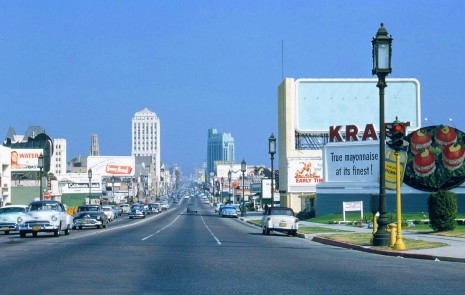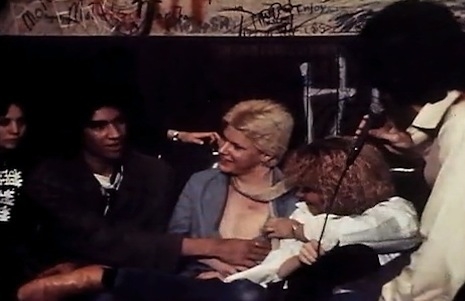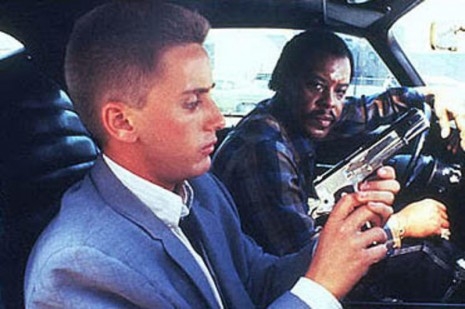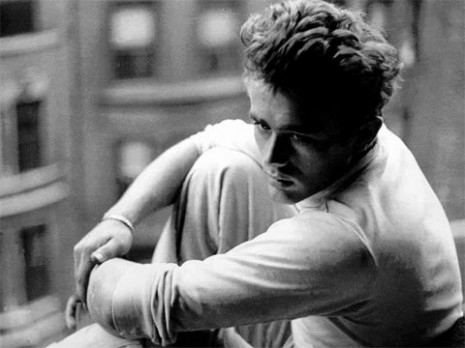
It almost makes me feel festive - beautiful footage of Christmas time on Hollywood and Sunset Strip during the 1940s.
Previously on Dangerous Minds

It almost makes me feel festive - beautiful footage of Christmas time on Hollywood and Sunset Strip during the 1940s.
Previously on Dangerous Minds

The Germs’ Pat Smear & Lorna Doom get touchy-feely with lead singer Darby Crash in The New Wave
“Not exactly wholesome, you might say,” notes slick & laid-back narrator Andrew Amador at the end of this weird and rather incomplete look at the burgeoning new music scene in Los Angeles.
Inexplicably opening up with the highly New York sounds of Patti Smith’s version of “Gloria,” The New Wave seems to have been a quick segment put together by erstwhile TV host Amador and shot by someone called Andre Champagne. I wonder if and where it actually aired. It’s an interesting enough artifact in that it features:
Originally posted on 10/26/2010.

It was about Nuclear War. Of course. What else could it be about? Director Alex Cox on his first major movie, Repo Man. Yes. It was about Nuclear War:
And the demented society that contemplated the possibility thereof. Repoing people’s cars and hating alien ideologies were only the tip of the iceberg. The iceberg itself was the maniac culture which had elected so-called “leaders” named Reagan and Thatcher, who were prepared to sacrifice everything—all life on earth—to a gamble based on the longevity of the Soviet military, and the whims of their corporate masters. J. Frank Parnell - the fictitious inventor of the Neutron Bomb - was the central character for me. He sets the film in motion, on the road from Los Alamos, and, as portrayed by the late great actor, Fox Harris, is the centrepoint of the film.
Alex Cox is cinema’s great wayward genius who has continued to make films against the odds and on ever decreasing budgets. After Repo Man (1984) came his flawed punk biopic on Sid and Nancy (1986), which owed more to Cox’s imagination than fact. But let’s be fair, it’s Cox’s imagination that makes his films so interesting, even when it is demented, as was seen in his 1987 romp, Straight to Hell, which starred Dennis Hopper, Shane MacGowan, Elvis Costello, The Clash and Courtney Love in what was really a semi-autobiographical home movie as comic Spaghetti Western. The film was hated, but not quite as much as his next, the politically weighted Walker (1987), which paralleled the America’s involvement in Nicaragua in the 1800s with American foreign policy in the 1980s:
William Walker was an American soldier of fortune who in 1853 tried to annex part of Mexico to the United States. He failed, though his invasion contributed to the climate of paranoia and violence which led to Mexico surrendering large areas of territory shortly thereafter. Two years later he invaded Nicaragua, ostensibly in support of one of the factions in a civil war. But his real intention was to take over the country and annex it to the U.S. He betrayed his allies and succeeded in making himself President. He ran Nicaragua, or attempted to run it, for two years. In the U.S. he had been an anti-slavery liberal, but in Nicaragua he abandoned all his liberal pretensions and attempted to institute slavery. He was kicked out of Central America by the combined armies of Nicaragua, Costa Rica, and Honduras.
Walker tried to go back twice and was eventually caught by the Hondurans and executed…
...Walker was made in 1987, in the middle of the US-sponsored terrorist war against the Nicaraguan people. We made it with the intention of spending as many American dollars as possible in Nicaragua, in solidarity with the Nicaraguans against the yanks’ outrageous aggression against a sovereign nation. Then, as now, this was not a popular position with certain people in power. But it was the right one.
Denounced by critics and politicians, Walker finished Cox’s Hollywood career - a damn shame, as it is Cox’s masterpiece, a brilliant piece of cinema, that exhibits the kind of intelligence, humor and political film-making Tinsel Town desperately needs.
While Repo Man may be Cox’s best film, it can only be hoped that the future will see Alex Cox given the opportunity to bring his own particular vision to the mainstream, and not tread water with the so-so follow-up Repo Chick (2010), or gimmicks like Repo Pup.
Alex Cox discusses Repo Man here.
Straight to Hell Returns is now available.
Bonus clip of Alex Cox discussing ‘Walker’, after the jump…

After the success of his B-movie The Delinquents, Robert Altman was given the job of co-directing (with George W. George) a documentary on James Dean. The association of Altman’s surprise hit—about out-of-control kids who just “gotta have action”—and the young actor—who appealed to these troubled teenagers—was considered by Warner Brothers as too good an opportunity to miss.
Made in 1957, two years after the actor’s death, The James Dean Story is well-made documentary composed from archive and photographic footage, interviews and out-takes, which gives a great sense of Dean’s life and talents. The film was also a key piece in the actor’s mythologizing.
According to Forbes magazine, the James Dean estate makes $5m a year, which is more than the star made his lifetime. That his fame continues to grow says much about Dean’s ability to epitomize that certain something generations of film-goers have identified with over the past six decades. As Dennis Hopper once said about Dean:
“He seemed to capture that moment of youth, that moment where we’re all desperately seeking to find ourselves.”
Or, as Dean himself said, in a line from Antoine de Saint Exupéry’s The Little Prince:
“What is essential is invisible to the eye.”

You know Hollywood is already on the case.
With thanks to Suzanne Moore. Via Rachel Boyd